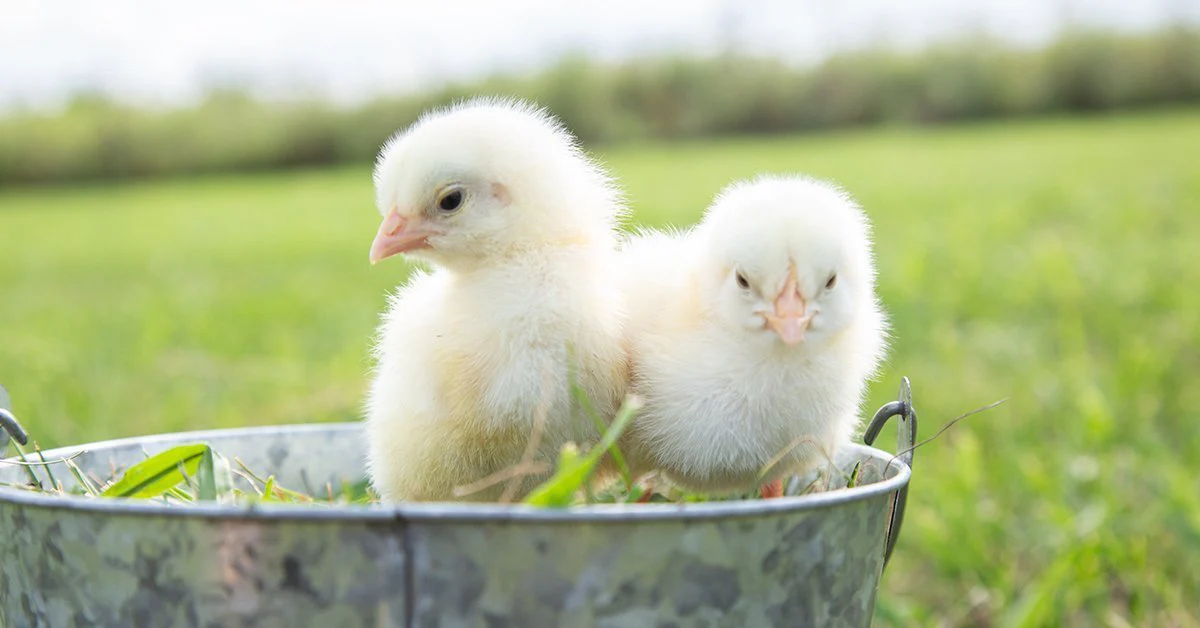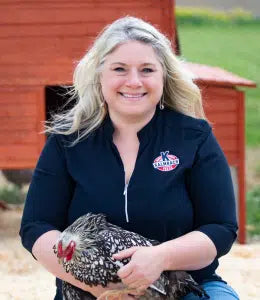How to Feed Your Baby Chicks

Peep, peep. Spring always brings a much-needed feeling of renewal and growth. Whether you are starting a new flock or hoping to add some youth to an existing flock, spring is the perfect opportunity to get some new chicks. Picking an appropriate Chick feed is an important step in ensuring that your new chicks get off to a good start. We have the perfect lineup of feeds to help your chicks grow strong and stay healthy.
How to Choose the Right Chick Feed
If you are raising chicks that will become laying hens, getting your babies off to a strong start will help them become thriving and healthy adults. If this is your first time raising chicks, choosing the right feed may seem overwhelming, but we are here to help!
Chicks Intended to Become Laying Hens
The vast majority of people that buy baby chicks for backyard production intend for those chicks to become laying hens. Our 18% All Natural Start Right Chick feed is the perfect feed for any babies that are intended to become laying hens. This feed is a combination starter/grower so it is the only feed that you will need until your babies grow up and are ready to lay. This feed also contains LifeGuard®, which is specifically designed to support gut health and keep the immune system strong, which is so very important for young chicks. Another great option for chicks that will be future laying hens is Chickhouse Reserve®. If you love Henhouse Reserve®, Chickhouse Reserve® is the perfect starter/grower feed for your new babies!
Meatbirds
If you are raising meatbirds, you will need a high protein starter/grower feed. Meatbirds grow very fast and they require a lot of dense nutrition to support that fast growth. Our 22% All Natural Start-to-Finish Meatbird feed is designed to meet all of the nutrient needs of your meatbirds from Day 1 to market weight. Not only will this feed help your meatbirds perform at peak potential, it also contains LifeGuard®, which is specifically designed to support gut health and keep the immune system strong.
How to Actually Feed Chicks
Once you decide to get new baby chicks, setting up your brooder is a fun and exciting step. We can go over the basics of brooder setup in another article; I want to concentrate on feeding today. Have you ever sat back and watched a 1 or 2-day-old baby chick? It is really awe-inspiring to see how quickly these young babies start to exhibit “normal” chicken behavior. Almost as soon as those babies hatch and get their legs underneath them, they will start scratching around for food. This is why I always put my chick feed on paper plates or plastic trays for the first 1-3 days. Before I even bring those babies home, I will put my paper plates in the brooder and then scoop my feed right on top so the feed can warm to proper temperature. Then, I bring my babies home and put them right down on top of that feed. It’s amazing!! Almost immediately, their natural instinct to scratch and peck will take over and BOOM, your babies are eating and getting essential nutrition. This has helped so much with getting ALL of my babies on feed. Of course, I can only do this for 1-3 days because they will begin to poop in the feed and they will scratch a lot of feed off the plates. Once I’m confident that everyone is eating well, I will move the feed to a standard chick feeder or feeder trough to keep it cleaner and prevent waste.
What’s Important About Chick Nutrition
Getting your baby chicks on a high quality feed as soon as possible provides all of the nutrients chicks need. A baby chick has A LOT to do in the first few weeks of their life. They need to start growing, they need to put on their feathers, and they need to develop their immune systems. Chickens are amazing! Most other baby animals will receive some innate immunity from their mothers during pregnancy. They will also receive high quality antibodies from colostrum, which is the first milk that mothers produce right after giving birth. Poultry, however, do not have this same advantage. So, those first few days and weeks are so very important in helping your baby chicks develop their intestinal tract, put on feathers, and develop their immune systems. Our line of starter/grower feeds are specifically designed to focus on the nutrition needed for all of these essential functions.
Having Fun While Feeding Your Chicks
As I mentioned before, spring always brings such a welcome sense of renewal. I absolutely love raising and caring for new babies. Watching the chicks and seeing their natural behaviors and individual personalities start to blossom is so much fun! It may also be tempting to start to spoil your babies with treats. However, I encourage you not to give treats or extras to chicks. Wait until your birds are full sized. Most treats, blocks, etc. are going to be recommended no earlier than 14+ weeks anyway. A high-quality complete feed formulated specifically for young birds should be their primary source of nutrition and available for them to eat at all times. Have fun, enjoy the season, and be careful about that chicken math. It sneaks up on you!
